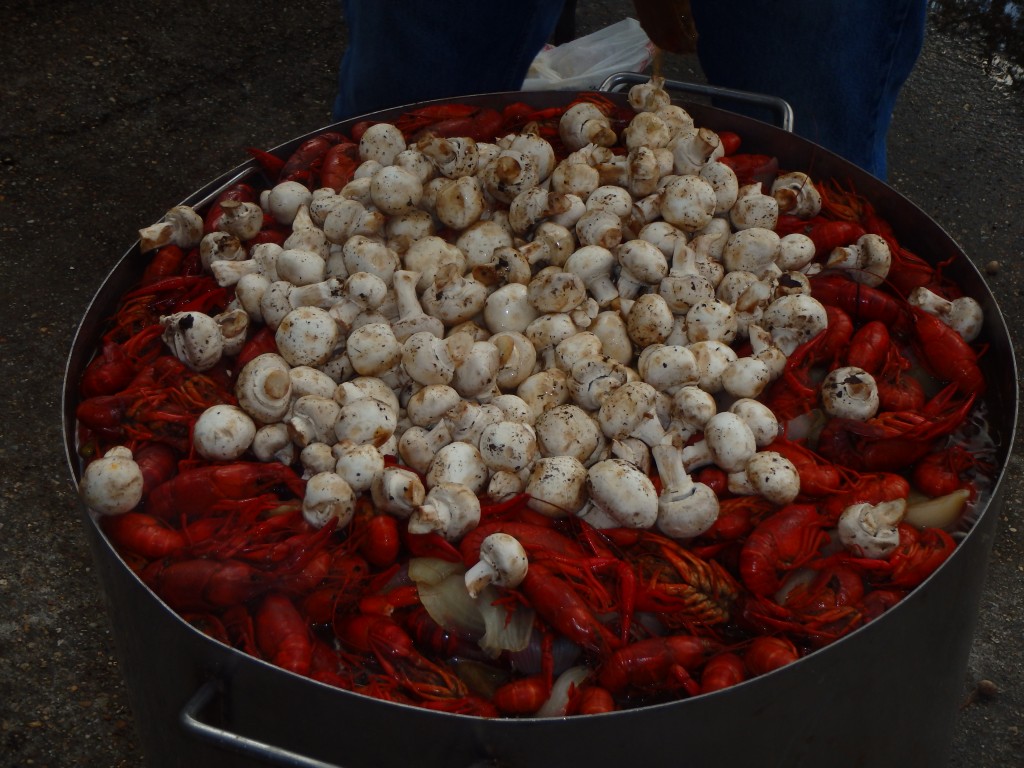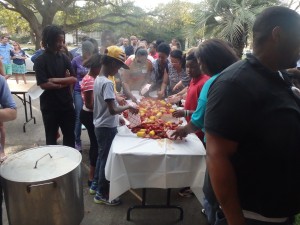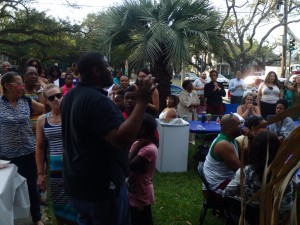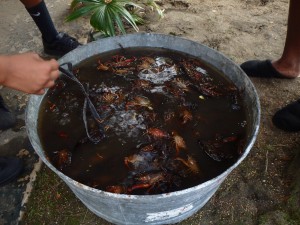 My host and I got into his little compact and drove to this crawfish boil, which was being held by the Greater New Orleans Fair Housing Action Center. This center sued in cases of housing discrimination (and just to remind you that this is still a problem I will note that the last president of the United States – George W. Bush – moved from the White House into a gated community which had provisions prohibiting blacks from living there as recently as the year 2000). My host, John, was a civil rights lawyer, with various issues in his portfolio, from capital cases to challenging Louisiana rules about public provision of defenders. Going around New Orleans with him was like Twain’s “Travels With A Reformer”: it was sometimes hard to believe that there were people doing things so unabashedly humane and decent. It made my attempts at goodness seem rather amateur, to say the least. And my host was doing this for people who occupied the very lowest place in our society: the people, fellow citizens of ours, whose lives we think so little of that we empower our government to coldly and callously kill them, even when they are powerless.
My host and I got into his little compact and drove to this crawfish boil, which was being held by the Greater New Orleans Fair Housing Action Center. This center sued in cases of housing discrimination (and just to remind you that this is still a problem I will note that the last president of the United States – George W. Bush – moved from the White House into a gated community which had provisions prohibiting blacks from living there as recently as the year 2000). My host, John, was a civil rights lawyer, with various issues in his portfolio, from capital cases to challenging Louisiana rules about public provision of defenders. Going around New Orleans with him was like Twain’s “Travels With A Reformer”: it was sometimes hard to believe that there were people doing things so unabashedly humane and decent. It made my attempts at goodness seem rather amateur, to say the least. And my host was doing this for people who occupied the very lowest place in our society: the people, fellow citizens of ours, whose lives we think so little of that we empower our government to coldly and callously kill them, even when they are powerless.
Like many people engaged in psychologically difficult work John compensated by being lighthearted. “You see Louisiana is a great place for a civil rights lawyer,” he said. “You never run out of work to do. And the cases are usually pretty interesting.” He thought about it some more. “The food’s not bad, either.” He turned the car down Jefferson Davis Boulevard. “This is probably the only Fair Housing Action Center located on a Jefferson Davis Boulevard. I’m not sure about that but I’m willing to suggest that it might be true. You know there’s a place in New Orleans where Jefferson Davis almost intersects with Martin Luther King Jr. Boulevard.” He looked at me and flashed a boyish grin. “Almost, but not quite.”
 We pulled up to the crawfish boil, which was taking place on the wraparound front lawn of the “Center,” a modern building on a prominent corner. One of the most astonishing things about New Orleans, to a visitor from America, is the way this city uses its front lawns: given a choice between a party in the back or front yard, in New Orleans people always have it in the front and everywhere else in America it is in the back. For a community organization, of course having it out front was brilliant: two separate people who happened to be walking by asked me who was hosting the boil and what the Center did, and if people were asking me, who was just one among over a hundred people there, they were asking other people too. Many of them got invited in, and many saw friends of theirs and thereby were drafted into the fold. And I will say, from private parties I have been to in New Orleans, that people like holding their parties in their front yards for the same reasons. You might meet a new friend that way.
We pulled up to the crawfish boil, which was taking place on the wraparound front lawn of the “Center,” a modern building on a prominent corner. One of the most astonishing things about New Orleans, to a visitor from America, is the way this city uses its front lawns: given a choice between a party in the back or front yard, in New Orleans people always have it in the front and everywhere else in America it is in the back. For a community organization, of course having it out front was brilliant: two separate people who happened to be walking by asked me who was hosting the boil and what the Center did, and if people were asking me, who was just one among over a hundred people there, they were asking other people too. Many of them got invited in, and many saw friends of theirs and thereby were drafted into the fold. And I will say, from private parties I have been to in New Orleans, that people like holding their parties in their front yards for the same reasons. You might meet a new friend that way.
John was absolutely, positively, the single best party host I have ever had in my life. He introduced me to everyone, telling them about my bike trip, which made me the object of admiration everywhere. And once I had told some of my brushes-with-the-law stories, John particularly introduced this aspect of my experiences into the conversation with several chosen people.
“This is John he’s biking up the Mississippi River,” he would say. “He had some fun in Plaquemines Parish. Apparently in Plaquemines Parish now it’s illegal to take pictures of buildings. John was not detained but he was told that police might detain you for taking pictures.”
“Plaquemines, man, I tell you, you’re glad you didn’t end up in jail there. Sometimes I think they’re just makin’ the laws up as they go ‘long.”
“John this is terrible to say,” John said, “but I almost wish you had had more of an encounter with the police, just to get their perspective on this. But probably that would not have been what you wanted.”
With another couple I spoke about St. Bernard Parish. “I couldn’t believe how loud people were there,” I said.
The lady spoke up. “You know, I know it’s like a stereotype and everything, but it’s so true. My boyfriend he’s from the Parish, and when I first met his mother, I was like, ‘Why is she shouting at you? It’s like she’s angry or excited – like all the time. But now I realize that’s just the way his family talks.”
“It’s true,” he laughed. “They’re really loud. So’s everyone else I grew up with, it’s just the way it is.”
As you might imagine, this place was a who’s who of the liberal activists of New Orleans. I met a woman who grew up in a Henry George community in New Jersey; I didn’t even know these existed. Henry George wrote a book called Progress and Poverty in 1879, which is still good reading; it centers on the problem in its title, which is that the advancement of industrial civilization seems to create not only great wealth but great destitution. George sought some kind of modification to our laws and customs to alleviate this problem. In the book he fairly convincingly argues – I am working from my memory here, but this is what I took from the book – that the best remedy is to make a tax on land the main source of revenue for government. And such a tax would not be on improvements to the land – building an addition does not make your taxes go up – but the tax merely reflects the value of the place itself. Such a system would make it functionally impossible to hold land without doing something with it, and to do something with it would mean employing someone. In other words, the system would put constant pressure on capital to resolve itself into labor. Apparently there are several communities in America operating on something at least approximating this system, and one of them in New Jersey. The woman was a wonderful, thoughtful person; she encouraged me to relearn what little I knew of Henry George.
The gathering was that most unusual American phenomenon, a true mixed-race event, with whites and blacks in what looked like real harmony coming from common purpose. This is, I hear, one of the ways that Katrina has changed New Orleans: it remains a fun city, and in some ways an irresponsible one, but there is another side to it now: a purposeful, committed side. Living in New Orleans, in the shadow of all its problems – the racism, the violence, the corruption, the drug addiction, the poverty, the ignorance, the impending destruction at the hands of the next hurricane, or river flood, or whatever will get New Orleans – makes life significant. To buy a house, to plant a tree, to raise children, to be a good neighbor, to start a business – these things are not just normal things there, but purposeful statements. They are statements of faith – and I love being around it.
 The kids and I poked a bit at the crawfish, and I did feel a pang of sadness seeing them crawl over each other in their last minutes of life, but into the boil they went, with the mushrooms and onions and pepper and oranges – citrus apparently minimizes the fishy taste of fishy things. I had some crawfish – I couldn’t rightfully abstain from such a supper of the Lamb – and ate a few of the oranges too, though it was all peppery enough to make an Irish woman’s son cry. The executive director gave a speech, and my host was ribbed a bit for his hair – which looks exactly like John Edwards’ hair (and they are both from North Carolina too), and I was having a grand old time when my host told me it was time to hit the next party. I said to him, “God, I hadn’t been in New Orleans an hour before I made it to my first crawfish boil, now I’m off to the second party and it’s barely even dark. I can’t explain why I don’t live here.”
The kids and I poked a bit at the crawfish, and I did feel a pang of sadness seeing them crawl over each other in their last minutes of life, but into the boil they went, with the mushrooms and onions and pepper and oranges – citrus apparently minimizes the fishy taste of fishy things. I had some crawfish – I couldn’t rightfully abstain from such a supper of the Lamb – and ate a few of the oranges too, though it was all peppery enough to make an Irish woman’s son cry. The executive director gave a speech, and my host was ribbed a bit for his hair – which looks exactly like John Edwards’ hair (and they are both from North Carolina too), and I was having a grand old time when my host told me it was time to hit the next party. I said to him, “God, I hadn’t been in New Orleans an hour before I made it to my first crawfish boil, now I’m off to the second party and it’s barely even dark. I can’t explain why I don’t live here.”
“Yes this place is special isn’t it?” he said. “It’s the only city I’ve been to where you don’t necessarily feel you have to go out on weekends – because you’ve already been out partying every single night of the week. By the time the weekend comes, you’re exhausted.”

One Comment